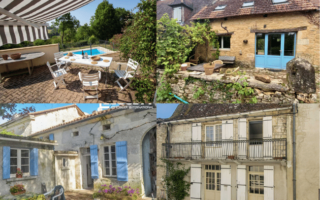France’s ‘tontine’ clause
The ‘tontine’ clause is one solution to France’s forced heirship rules but it has its disadvantages as well as benefits, as Matthew Cameron explains
While the consequences of the inclusion of a tontine clause in a French property purchase deed are the subject of much legal commentary, it is nevertheless worth reviewing this structure once more.
Solicitors are often accused of being a pessimistic bunch – always looking for the ‘worst case scenario’ and advising accordingly. There is perhaps some justification in this – when our clients tell us of their plans, we then look at these and try to imagine what could happen, and what might potentially go wrong.
On this basis, when clients tell a solicitor specialising in French law that they are looking to purchase a house in France, one of the main questions we will look to raise is what they expect to happen when one of them dies.
French inheritance law and tax rules differ substantially from the position in the UK. In this article, we will look at one of the options that is often proposed, and consider if and when that option should be implemented.
JOINT OWNERSHIP
Inclusion of a tontine clause in the purchase deed is something that many of our clients tell us they want to do. This is often because it is a structure that in some way reflects the sort of joint ownership commonly employed in England and Wales, allowing the survivor to become the sole owner of a property.
Many buyers are aware that in France children are, in principle, entitled to a part share of the house when a parent dies, and want to ensure that the surviving spouse/partner inherits absolutely. It is for this purpose that buyers often want to include a tontine clause in the deed.
The tontine clause does indeed ensure that the survivor of joint owners will be the sole owner: in fact the clause is a ‘legal fiction’ inserted into the deed, which declares that when one of the co-owners dies, it will be ‘pretended’ that the survivor was the only person who had ever bought the property in the first case, and that the deceased had never been an owner.
So for this then, it would appear that the tontine structure works to do exactly what would have been intended.
PROS AND CONS
There are, however, some disadvantages to this method of ownership. The first is that, unlike standard ownership ‘en indivision’, where a sale can be forced by either party (going through the court if necessary), when a property is held en tontine, only the absolute agreement of the joint owners, or death of one of them, would allow for any amendment to the title.
This could be problematic where a couple cannot agree on what to do, or indeed where one of the owners is incapable of making a decision.
Another concern is inheritance tax. Since France prefers property to pass down bloodlines, any deviation from a gift to children can have tax disadvantages.
Even if the children are common to the two owners, it is likely that a greater exposure to French inheritance tax will arise if the survivor inherits all of the property, rather than some passing to the children at the time of the first death. That, though, may be just the small price to pay for ensuring the survivor inherits absolutely, if that is seriously what is intended.
UNMARRIED COUPLES
However, the tax position can be even worse if the joint owners were not married. In such a situation, the tontine clause results in inheritance tax being applied on half of the total value of the property in question at a rate of 60%, with only a very small tax-free allowance.
So if the property were worth €200,000, there would be a tax bill of about €60,000. Clearly this could potentially result in the property having to be sold to pay the tax, which is hardly an ideal way of administering a deceased person’s estate.
CASE IN POINT
By way of example, I was contacted by a mother and son recently, who we shall call Ann and Bob. Ann had bought a house in France with Chris, Bob’s father, and they had included a tontine clause in the deed, although Ann could not recall this.
When Chris died, Ann and Bob told me that they would complete the succession, so that Bob would inherit all of his father’s share; there would be no inheritance tax, as the amount Bob was to inherit from his late father was within his tax-free allowance.
Ann and Bob would hold on to the house for a few years, or perhaps until prices improved sufficiently for them. They would then split the proceeds, to make a tidy profit.
They had not, however, anticipated the consequences of the tontine structure, by virtue of which Ann inherited the entire house. Ann and Chris were not married; thus when she inherited Chris’s half, she had to pay inheritance tax at 60%. So the only true winner was in fact the French tax office.
WORST CASE SCENARIO
The moral here is that just as with any structure of ownership, the potential disadvantages must be considered in detail, just as the advantages should be.
There are often adverse consequences to any structure, and all of these must be taken into account. There are in reality many instances where tontine ownership is the best format – or perhaps the ‘least bad’ format – and it can therefore be right to include this clause in the deed.
Where there is doubt, the fact remains that it is possible to dissolve a tontine once it is included in a deed (albeit at a cost), but it is not possible to insert the clause after the purchase is finalised.
So the lawyers can perhaps be justified in going for the worst case scenario and then working upwards. At least in that way, the buyer will be aware of why a particular structure may be suitable – or not.
There are many ways of applying inheritance rules to any given situation, so it is always sensible to seek expert advice, and as early as possible to ensure the most beneficial outcome.
Matthew Cameron is a partner at Ashton KCJ where he heads the firm’s French legal services team
Tel: 01603 703070
www.ashtonkcj.co.uk
Share to: Facebook Twitter LinkedIn Email


